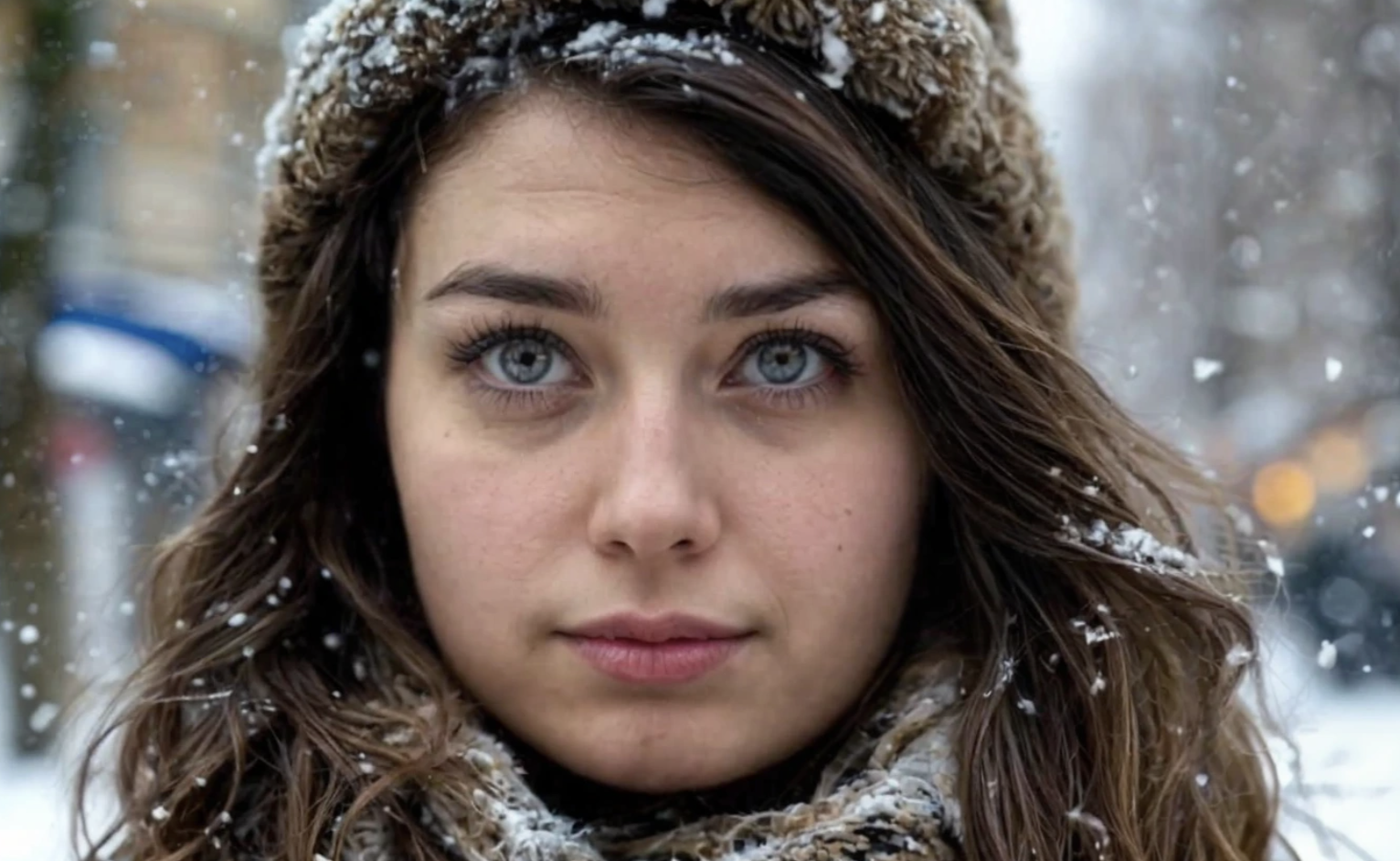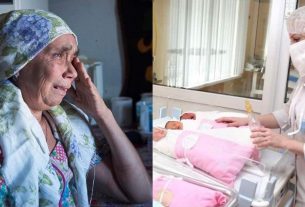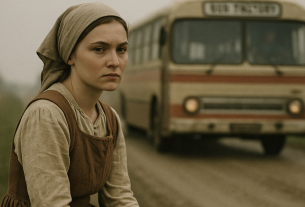The customary, measured, calm life of fifty-two-year-old accountant Lyudmila Borisovna Belkina was fundamentally shattered by an impending disaster: her beloved son Vladik was getting married!
Lyudmila and her son had long lived in Mytishchi, near Moscow. After the death of her parents, Lyuda, with little Vladik in tow, moved there, regretlessly selling the large, sturdy, beautiful family home in Vyatskoye.
She had always dreamed of living in Moscow, but it hadn’t worked out, so she settled in Mytishchi, in an ordinary multi-story panel building.
From a young age, Lyuda felt like a city dweller at heart. She first saw Moscow at eleven and fell in love forever with its beautiful, noisy, vibrant, never-sleeping atmosphere.
From that day on, Lyudochka suffered from life in the village: she was irritated by the large, well-built family home with carved shutters, irritated by an antique, great-grandmother’s homespun linen tablecloth decorated with intricate embroidery, which her mother proudly laid on the table during holidays. She was annoyed by the beautiful, narrow Uhtanka River where her father fished all year round, annoyed by the rural expanse and even the air of the village.
In her youth, Lyuda was tall, strong, and well-built. A mane of thick chestnut hair, large eyes framed by long dark lashes, a slightly upturned nose, and freckles across her face. She lacked the delicate elegance often characteristic of city girls—she was bursting with health, strength, and youthful freshness.
From her youth, Lyudmila dreamed of living in a fashionable Moscow high-rise with a high-speed elevator, in a huge, bright apartment on the top floor, with a large TV, expensive porcelain dishes, and a beautiful view from the window.
In school, Lyuda was an average student until she befriended Maya Lipskikh—a top student, bookworm, and nerd. As soon as the girls became friends, all of Belkina’s grades began to improve dramatically. Lyudmila spent days at Maya’s—girls together did homework, concocted culinary “masterpieces” in the small kitchen, shared girlish secrets and mysteries.
Graduation put an end to their friendship: Lyuda spent the entire evening dancing with Leon Vinarsky—a tall, handsome, dark-skinned guy with a mane of unruly dark hair, on whom geeky Maya had had a crush since sixth grade. Only Lyuda knew about this secret schoolgirl crush of Maya’s.
Out of the corner of her eye, Lyudmila noticed how Maya’s face lit up, then rapidly paled. Lipskikh leaned against the wall and did not take her unhappy blue eyes off them, paling more after each of their dances. When Lyuda and Leon spun in a waltz, Maya’s lips trembled, mascara betrayed her by streaming down her cheeks, she sobbed and ran out of the hall. Belkina just smirked to herself—she no longer needed that enthusiastic, naive fool Maya.
After school, Lyudmila easily got into a fairly prestigious Moscow college to study accounting.
Belkina was smart—she studied quite well, despite an endless series of fun student parties. From the first year, Lyuda began “hunting” for young Muscovites, but the Muscovites didn’t seem particularly eager to fall into her skillfully laid traps.
Lyuda rarely visited Vyatskoye—she didn’t miss her mother, who was like a squirrel in a wheel, tired and prematurely aged from worries, nor her frequently ill father, nor her old, grumpy, half-deaf granny. Upon receiving news of Granny Zina’s death, Lyuda decided not to attend the funeral—she needed to prepare for an exam.
In her last year, in October, Lyudmila met Maxim—and disappeared. She fell in love with his large dark eyes, a hedgehog of unruly red hair, his occasionally biting humor.
Max was two years older than Lyuda; he came to Moscow from Omsk and was studying to be a dental technician. Love swept them up and stirred up everything bright in Lyuda’s soul. Belkina became a bit more feminine, softer, more compliant. However, her inherent sharpness and toughness went nowhere—it just hid for a while, “crawled under a log”.
Neither Max nor Lyuda had money for a rented apartment, so they met in dormitories, occasionally at friends’ dachas. Lyudmila felt that they had their whole lives ahead of them, that they would definitely be happy.
Alas, it was just an illusion.
The breakup was painful. Lyuda didn’t yet know she was pregnant. By summer, a month before Lyudmila’s graduation from college, Max met twenty-year-old Muscovite Lilia—an educated, delicate, gentle porcelain statuette.
Lyuda immediately realized that Maxim had someone else—his look even changed. It wasn’t just love but passion—the kind that happens once in a lifetime.
Max told her he met someone else, asked for forgiveness, suggested staying friends. She could barely distinguish the words, everything blurred before her eyes. Lyudmila couldn’t scream or cry, and only burst into tears when Maxim left, slamming the door.
The fight with Lilia was almost unremembered: in the evening she ambushed the girl at the metro exit and furiously pulled her by the hair. Some people broke them up. In Lyudmila’s memory forever remained the scratched face of the fragile dark-haired girl, her huge brown eyes.
That Belkina wasn’t expelled from college after all these stunts was a miracle. They just pitied her, and Lilia didn’t “pedal” the incident.
The confrontation with Maxim broke Lyuda’s heart. She told Max about her pregnancy, but after the incident with Lilia, he looked at her as if she were a poisonous snake and, articulating each word, said:
“I wouldn’t marry you even if you were the last woman on Earth. But I will help with the child.”
After graduating from college, Lyudmila, heavily pregnant, had to return to Vyatskoye. Little Vladik revived and somewhat softened her frozen, hardened heart: she took her parents’ help for granted, but she was happy about the baby with that sweet, hidden female joy that lives in the soul of every woman.
Almost immediately upon arriving in Vyatskoye, Lyuda encountered Maya at the church—and was stunned. Where had the former sickly nerd gone? The former geek blossomed, became beautiful with a calm, deep beauty of a happy woman. Maya held the hand of a small beautiful dark-haired girl. Giving Lyudmila a cold, contemptuous look, the former friend silently passed by.
“Mom, do you remember Lipskikh? Well, my former classmate?” Lyuda asked her mother in the evening.
“Mayka? Of course, I remember. She works at the ‘House of Angels’ museum now. She married Leon Vinarsky, they have two daughters. He also stayed in Vyatskoye—studied to be a paramedic and came home…”
“Clear,” Lyuda muttered barely audibly.
A dull envy for someone else’s happiness sliced through her heart.
Maxim regularly sent money for his son, but didn’t want to see Vladik. Lyuda knew he had married Lilia and the young couple was expecting a child.
Days dragged on. A caring, loving grandmother sewed and knitted Vlad beautiful bright outfits, grandpa dreamed of taking his grown-up grandson fishing, and Lyuda felt alien and superfluous in Vyatskoye: she never managed to love her native village.
As soon as Vlad turned two, Belkina once again rushed to conquer Moscow, leaving her somewhat grown son with her parents.
Lyuda was lucky: she got a job as an accountant in a small firm, rented a tiny apartment on the outskirts. She dug into work with her teeth, worked for two, arrived at the office first and left last, gossiped, snitched, brown-nosed, and tirelessly climbed the career ladder.
Colleagues behind her back called Lyuda “Cannibal” – and rightly so. Help, friendship, mutual assistance—these concepts meant nothing in Belkina’s life. But to usurp a colleague’s place—yes, that was sacred.
Vlad grew up at his grandparents’ until he was seven, in the rural freedom. From May through September, he swam in the river, often went fishing with grandpa, drank fresh milk, ate apples from the tree, and strawberries from the bush.
During all those years, while her son grew up far from her, Lyuda made it to Vyatskoye a couple of times a year: for Vlad’s birthday and for a vacation—maximum a week.
Vlad started first grade in Moscow—Lyuda ran around all the nearby schools, choosing the best class and teacher.
Just before the first of September, Lyuda learned that Max had died. That night she couldn’t sleep because of the schadenfreude overwhelming her: now let Lilia, that fragile porcelain doll, find out what it’s like to raise a child alone!
Vlad was lucky with his class—it was strong and friendly. Lyuda attended parent-teacher meetings, carefully monitored her son’s studies. She grew to love the hated kitchen fuss and often made Vlad his favorite meat pancakes on weekends.
When Vlad turned eleven, his father and mother died within a year, and then, soberly assessing her financial capabilities, Belkina decided to part with Moscow and, selling the family home in Vyatskoye, settled in Mytishchi.
She bought a small two-room apartment on the seventh floor of a typical panel building, her son switched from a good Moscow school to a not-so-good school in Mytishchi, but being active and sociable, he quickly integrated into the group, became one of them.
Closer to his senior years, the son became interested in history, but Lyudmila wouldn’t hear of any excavations, the lost library of Ivan the Terrible, Egyptian pyramids, or other historical mysteries:
“Become an IT guy!” she insisted to her son. “And you’ll have money not just for bread and butter, but for red caviar.”
“I don’t like caviar, mom,” the son would throw his large, expressive, dark (just like his father’s!) eyes at her. “How do you not understand, mom! Finding the library of Ivan the Terrible, the famous Libereya! It’s a dream! It’s a world sensation!”
“A sensation to him!” Lyuda grumbled gloomily. “Well, who’s a historian? Do you want to spend your whole life searching for ancient shards in the mud? And then clean them and wash off the dirt?”
…Vladislav turned out to be an obedient son and after school, he trained as an IT guy. Life flowed measuredly and unhurriedly: Lyudmila Borisovna had been working as the chief accountant at a small office equipment trading company for many years, the small female team was used to their boss-cannibal and was almost silky.
Vladislav, who turned twenty-seven in September 2018, earned well, working as an IT guy, but out of habit still lived with his mother, spending all his money on vacation, on travel: he was obsessed with Ancient Egypt and the mysteries of the pyramids.
And then suddenly this calm, customary life changed fundamentally: Vladislav met Ksyusha—a young twenty-six-year-old librarian—dark-haired, graceful, limping—reminding Lyudmila painfully of Lilia. Ksenia was raising a four-year-old daughter Taisiya alone, and Vlad, to his mother’s surprise, seemed to find a way to connect with the little girl.
Vladislav’s phone filled with photos of happy moments: a laughing trio at the rink, at the movies watching some funny cartoon, in a café over ice cream.
Six months after meeting the girl, Vladislav told his mother that he was getting married. Lyuda dropped a cup to the floor in shock. She was overwhelmed by her son’s impending marriage, which loomed over her like an inevitable disaster.
Belkina swore to herself that she would break up her son with Ksenia—and she succeeded. She hired some guys, they conducted an investigation and did everything right: Vladik’s phone received dozens of photos of a completely drunk, naked Ksenia. It turned out that before giving birth to her daughter, the modest librarian from Mytishchi worked in Moscow either as an escort or something worse.
The young people broke up, Lyuda celebrated the victory. Her son became dejected, slouched, and for the first time in many years, didn’t go on vacation to Egypt, to his beloved pyramids. He sat at home all day, in front of the computer, eating his favorite from childhood, tender, airy cheese pancakes, which Lyuda cooked so wonderfully, nursing beer, watching stupid action movies, and playing computer “shooters”.
After a year, it became unbearable—Vlad was fired from his job, he started drinking—heavily. Beer was no longer enough, vodka entered the arena. Lyudmila tried to pull her son out of his drunken stupor, but unsuccessfully. Once, drunk, he even hit her.
Now Belkina cried a lot—her eyes rarely dried from tears. Large since youth, she had grown even larger in shoulders and waist, became heavier.
Rumors abound—realizing that life was falling apart, Lyudmila learned through third or fourth hands the phone number of a famous Moscow clairvoyant—Baba Fedora, who was rumored to overcome and drive away any misfortune.
She took a small vacation, and for four days, glued to the phone, she listened to short beeps in the receiver, but managed to get through to Fedora’s assistant and tearfully pleaded to be scheduled “closer”—in three weeks.
On a cloudy January morning, Belkina was in Chertanovo. She didn’t remember how she climbed to the fifth floor, how she rang the right doorbell—she only came to her senses when she found herself in a small, dim hallway, which smelled strongly—like in a church—of candles.
“Hello. I am Belkina. Lyudmila Belkina. I had an appointment for today, at eleven…”
“Hello. Take off your shoes and come in,” the thin, tall middle-aged woman nodded briefly in response. “They are waiting for you.”
Lyuda entered a small room illuminated by the light of a dozen candles. In the corner, in a heavy wooden chair, sat an elderly woman in a long warm robe. Her head was covered with a large colorful scarf. In front of the clairvoyant was a small table where candles burned brightly.
How old was Fedora? Hard to say. She could be seventy or eighty-five. A frail figure drowned in a dark robe, a pale face with huge brown eyes, neatly tied up absolutely gray hair, dry wrinkled hands with long knotted fingers.
“Why are you standing? Sit down, there’s no truth in legs.”
Lyuda silently sat on a squeaky low stool.
“Good afternoon. My son drinks,” she said quietly. “And life, as if it has all slid downhill. I don’t know what to do…”
“Yulia, bring some water!” Fedora called out with a trembling voice. A minute later, a deep bowl of water was on the table.
Fedora took a small round mirror out of her robe pocket and lowered it into the bowl of water, then closed her eyes and something, barely moving her lips, whispered a rapid, hoarse patter.
Lyudmila felt like she had been sitting on that squeaky stool forever when suddenly the old woman widely opened her huge amber eyes and stared into the water with a frightening, motionless gaze:
“Well, what do you want?” the scratchy old voice cut through. “Why did you cling to your son? Why has he been sitting at your skirt for so many years? Your son met a girl—you ruined everything…”
“But she was…”
“Who she was is none of your business,” Fedora sharply interrupted her. “You didn’t walk her paths or cry her tears to judge her.”
The old woman fell silent and again stared intently into the bowl:
“I’ll give you enchanted water, add it to tea, coffee, or soup—your son will stop drinking. But don’t stand between him and his fate anymore, or it will be bad.”
Half of February had already passed, but winter showed no signs of leaving. One evening, returning home from the store, Lyudmila decided to take a longer circular route: she didn’t want to return to an empty apartment—Vlad had not been living at home for a week, and she had only a few purchases—a yogurt and a couple of bananas, the bag was very light.
The enchanted water helped: her son stopped drinking and got a job somewhere—she didn’t really know where. Yesterday, neighbor Anna told Lyudmila that she had seen Vlad at the local hill, where kids from nearby houses sled, in the company of a girl and a little boy.
“I know this girl,” Anna said, smirking crookedly. “She sells at the market. From the ‘newcomers’. Either Turkmen or Tajik, named Leyla. And her son—Amir. About six years old.”
And now Lyudmila, her heart pounding, walked to the hill. She hid behind the corner of a nine-story building, almost abutting the hill, and, unnoticed by anyone, watched.
Vlad was indeed there: tirelessly he slid a large green “tube” down the hill with a little boy in a long black coat and the same black hat. He carefully slid the “tube” down the hill, then ran after it and again dragged it to the top.
“Amir! Vlad! That’s it, time to go home! It’s cold!” a petite woman in a short blue down jacket shuffled from foot to foot at the top, trying to warm up.
“Leyla, we’re coming now!” Vlad’s joyful voice reached Lyudmila through the wind.
Vlad forcefully pushed the “tube,” it rapidly sped down the hill, kicking up snow dust, the boy squealed with delight. Vladislav and Leyla, holding hands, carefully ran down the slope. The son, not letting go of the girl’s hand, pulled the “tube” with the other, on which a laughing, contented rider sprawled.
Lyudmila watched the happy trio until they disappeared around the corner, then slowly trudged home.
That evening, Belkina cried for a long time—the iron concrete shell of her soul was crumbling. Taking out an old thick album from a cracked time-worn cover, once brought from her parents’ home and ruthlessly thrown onto the mezzanine, she carefully examined the old black-and-white photos, touching the almost forgotten faces of Granny Zina, her mother and father with trembling fingers.
“I should go to Vyatskoye in the summer, visit the cemetery, clean up there and renew the crosses on the graves,” she thought cautiously, closing the album.
And everything will be fine for Vladislav—now she was sure of that.



